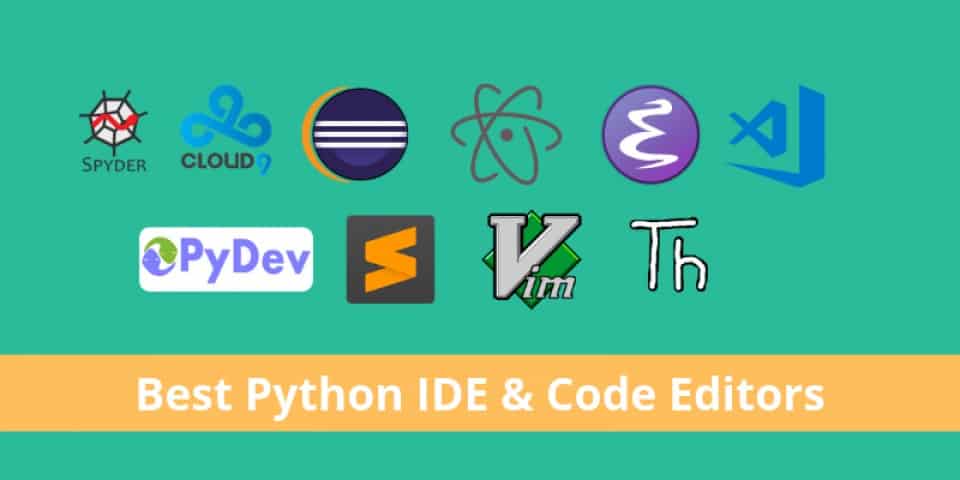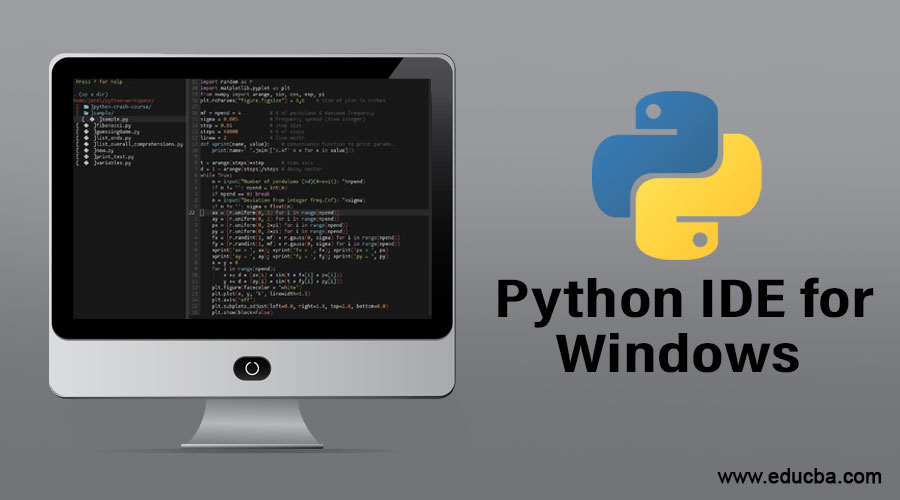Introduction: The Significance of Choosing the Right IDE
Selecting the best free IDE for Python development on Windows is crucial for maximizing productivity, ensuring a smooth learning curve, and achieving project success. An IDE, or Integrated Development Environment, combines essential tools for software development, such as code editors, debuggers, and version control systems, into a single intuitive interface. By choosing the right IDE, developers can streamline their workflow, enhance their learning experience, and create high-quality Python applications more efficiently.
Understanding IDEs: Features and Functionality
An Integrated Development Environment (IDE) is a software application that combines essential tools for software development, such as a code editor, debugger, and version control system, into a single interface. IDEs simplify the development process by providing a streamlined and intuitive environment for developers to write, test, and debug their code. For Python development on Windows, choosing the right IDE is vital for maximizing productivity, learning, and project success.
IDEs offer numerous benefits for Python developers, including:
- Code suggestions: IDEs can provide real-time suggestions for code completions, reducing the likelihood of syntax errors and speeding up the coding process.
- Debugging tools: IDEs often include advanced debugging capabilities, allowing developers to identify and fix issues in their code more efficiently.
- Version control: IDEs can integrate with version control systems, such as Git, enabling developers to track changes, collaborate with others, and manage their codebase more effectively.
- Extensibility: Many IDEs support third-party plugins and extensions, allowing developers to customize their environment and add new features tailored to their specific needs.
Top Free IDEs for Python on Windows
When searching for the best free IDEs for Python development on Windows, it’s essential to consider factors such as user interface, community support, and extensibility. Based on these criteria, the following IDEs stand out as top choices:
- PyCharm Community Edition: This free, open-source IDE offers intelligent code assistance, debugging tools, and integration with version control systems. Its intuitive user interface, active community, and extensive documentation make it an excellent choice for both beginners and experienced developers.
- Visual Studio Code: A lightweight yet powerful IDE, Visual Studio Code boasts strong support for Python development, including Git integration, debugging capabilities, and a rich marketplace of extensions. Its customizable interface and active community contribute to its popularity among developers.
- Thonny: Thonny is a beginner-friendly IDE designed explicitly for Python programming. Its simplicity, step-through debugging, and educational focus make it an ideal choice for those new to Python or programming in general. Thonny’s user-friendly interface and targeted features simplify the learning process and promote a strong foundation in Python programming principles.
- Spyder: Spyder is an open-source IDE tailored for scientific Python development. It offers advanced features such as the IPython console, variable explorer, and editor with syntax highlighting. Spyder’s powerful capabilities make it an excellent choice for researchers, data scientists, and developers working on scientific projects.
- Jupyter Notebook: As a browser-based IDE, Jupyter Notebook is well-suited for data science and scientific computing. Its interactive interface, code and markdown support, and sharing capabilities make it a popular choice for researchers, educators, and students. Jupyter Notebook’s unique features and focus on collaboration make it a valuable addition to any Python developer’s toolkit.
1. PyCharm Community Edition
PyCharm Community Edition is a popular, open-source IDE for Python development on Windows. Developed by JetBrains, PyCharm Community Edition offers intelligent code assistance, debugging tools, and integration with version control systems, making it an excellent choice for both beginners and experienced developers. Its intuitive user interface, active community, and extensive documentation contribute to its popularity.
Key features of PyCharm Community Edition include:
- Intelligent code assistance with real-time error detection and code suggestions
- Integrated debugger and test runner for efficient troubleshooting
- Version control system integration, including Git, Mercurial, and Subversion
- Support for various Python web frameworks, such as Django and Flask
- Customizable interface and functionality through plugins
While PyCharm Community Edition is a powerful and feature-rich IDE, it does have some potential drawbacks for Windows users. For instance, its extensive feature set may be overwhelming for beginners, and its performance can be resource-intensive, potentially slowing down older or less powerful Windows systems.
2. Visual Studio Code
Visual Studio Code (VS Code) is a powerful, customizable IDE for Python development on Windows. Developed by Microsoft, VS Code offers robust support for Python, including Git integration, debugging capabilities, and a rich marketplace of extensions. Its flexible and modular design allows developers to tailor the IDE to their specific needs, making it an excellent choice for both beginners and experienced developers.
Key features of VS Code include:
- Built-in support for Git version control and integration with GitHub
- Advanced debugging capabilities, including step-by-step debugging, breakpoints, and call stacks
- Rich marketplace of extensions for adding functionality, such as linters, formatters, and debuggers
- Customizable interface and keybindings
- Support for various Python web frameworks, such as Django, Flask, and Pyramid
VS Code’s integration with Git and powerful debugging capabilities make it an attractive option for Windows users seeking a versatile and customizable IDE for Python development. However, its extensive customization options and feature set may be overwhelming for beginners, and its performance can be resource-intensive, potentially slowing down older or less powerful Windows systems.
3. Thonny
Thonny is a beginner-friendly IDE for Python on Windows, designed with simplicity, step-through debugging, and educational focus in mind. Thonny’s user-friendly interface and targeted features make it an ideal choice for those new to Python or programming in general, providing a strong foundation in Python programming principles.
Key features of Thonny include:
- Simple and intuitive user interface, making it easy for beginners to navigate
- Step-through debugging, allowing users to execute code line-by-line and inspect variables
- Interactive Python shell for executing and testing code snippets
- Syntax highlighting and error detection, helping users identify and correct errors quickly
- Educational focus, with features such as “Turtle graphics” for teaching programming concepts visually
Thonny’s simplicity and educational focus make it an excellent choice for beginners and educators. However, its limited feature set and lack of advanced debugging tools may not be sufficient for experienced developers or more complex projects.
4. Spyder
Spyder is an open-source IDE for scientific Python development, offering advanced features such as the IPython console, variable explorer, and an editor with syntax highlighting. Designed with a focus on scientific computing and data science, Spyder is an excellent choice for researchers, data analysts, and developers working on scientific projects.
Key features of Spyder include:
- IPython console for interactive computing and testing code snippets
- Variable explorer for browsing and inspecting variables and data
- Editor with syntax highlighting, code suggestions, and error detection
- Integration with popular scientific libraries, such as NumPy, SciPy, and Matplotlib
- Debugging tools, including step-by-step execution, breakpoints, and call stacks
Spyder’s advanced features and integration with scientific libraries make it an ideal choice for scientific computing and data analysis tasks. However, its focus on scientific Python development may limit its appeal for users working on other types of projects.
5. Jupyter Notebook
Jupyter Notebook is a browser-based IDE for data science and scientific computing, offering an interactive interface, code and markdown support, and sharing capabilities. Developed as part of the IPython project, Jupyter Notebook is an open-source web application that allows users to create and share documents containing live code, equations, visualizations, and narrative text.
Key features of Jupyter Notebook include:
- Interactive interface, combining code, rich media, and markdown in a single document
- Support for multiple programming languages, including Python, R, and Julia
- Integration with popular data science libraries, such as Pandas, NumPy, and Matplotlib
- Collaborative editing and sharing capabilities, enabling users to work together on projects
- Rich text and multimedia support, allowing users to create visually appealing and informative documents
Jupyter Notebook’s interactive interface and support for data science libraries make it an excellent choice for data analysis, machine learning, and scientific computing tasks. However, its browser-based nature and focus on data science may not be suitable for all types of Python projects.
Conclusion: Making the Right Choice
Choosing the best free IDE for Python development on Windows depends on your experience level, project requirements, and personal preferences. Each IDE offers unique features, advantages, and drawbacks, so it’s essential to evaluate them based on your specific needs.
PyCharm Community Edition is an excellent choice for experienced developers seeking a feature-rich, open-source IDE with extensive community support. Visual Studio Code is a powerful and customizable option for users who prefer a modular IDE with strong Git integration and a rich marketplace of extensions.
Thonny is a beginner-friendly IDE that simplifies Python programming with its intuitive user interface, step-through debugging, and educational focus. Spyder is an open-source IDE designed for scientific Python development, offering advanced features such as the IPython console, variable explorer, and editor with syntax highlighting.
Jupyter Notebook is a browser-based IDE for data science and scientific computing, emphasizing its interactive interface, code and markdown support, and sharing capabilities. By understanding the key features and benefits of each IDE, you can make an informed decision and optimize your Python development experience on Windows.






